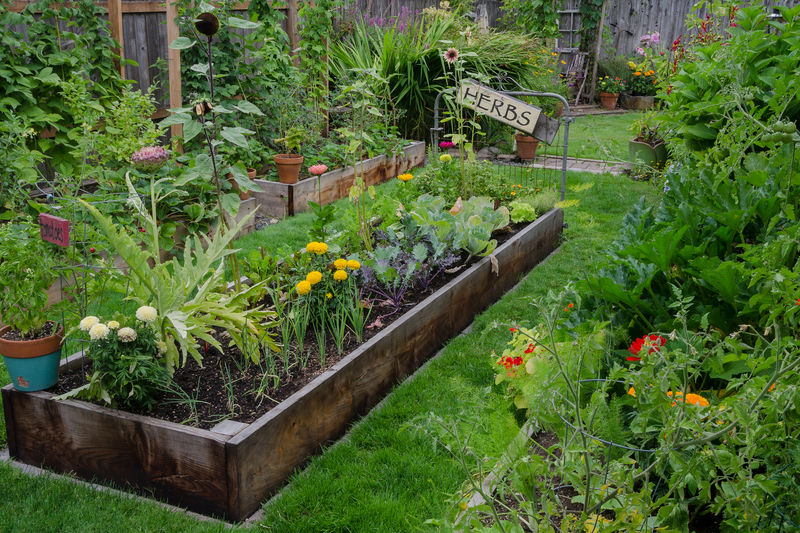Soil Sustainability through Organic Waste Use
Posted on 07/09/2025
Soil Sustainability through Organic Waste Use: Enhancing Soil Health Naturally
Soil is the cornerstone of all agricultural pursuits, forestlands, landscapes, and even urban vegetation. Yet, soil sustainability faces growing challenges due to overexploitation, erosion, nutrient depletion, and chemical pollution. In recent years, using organic waste as a resource to improve soil quality has gained significant traction among farmers, environmentalists, and policymakers alike. This article explores in depth how the strategic use of organic waste underpins soil sustainability and revitalizes ecosystems.

What Is Soil Sustainability and Why Does It Matter?
Soil sustainability refers to the capacity of soil to maintain its biological productivity, support plant growth, regulate water, recycle nutrients, filter pollutants, and maintain biodiversity over time. Sustainable soils lay the foundation for:
- Food Security: Healthy soils produce nutritious crops to feed the global population.
- Carbon Sequestration: They capture and store atmospheric carbon, mitigating climate change.
- Biodiversity: Soils host a vast array of microbes, insects, and other life forms.
- Water Regulation: Improved soils retain water, reducing drought and flood impacts.
The Threats to Soil Sustainability
Modern agriculture often relies heavily on synthetic fertilizers, monocropping, and over-tilling, which degrade soil structure and fertility. Erosion, compaction, chemical contamination, and loss of organic matter are widespread issues threatening soil health worldwide.
Organic Waste Utilization: A Natural Solution
Organic waste includes plant residues, food scraps, animal manure, yard trimmings, and other biodegradable materials. Instead of sending these resources to landfills, utilizing them in agriculture and landscaping can foster soil sustainability and restore critical soil functions.
Types of Organic Waste Used for Soil Improvement
- Compost: Decomposed plant and food waste providing rich organic matter.
- Manure: Livestock droppings that supply nutrients and beneficial microbes.
- Crop Residues: Leftover plant parts after harvest, such as stalks and leaves.
- Green Manures: Cover crops grown and incorporated into soil to add nutrients.
- Mulches: Grass clippings, leaves, and straw used as ground cover to retain moisture and suppress weeds.
How Does Organic Waste Foster Soil Sustainability?
-
Boosting Soil Organic Matter
Adding organic waste introduces organic carbon to the soil, which is fundamental for sustaining microbial life, improving soil structure, and enhancing water retention. High organic matter soils are less prone to erosion and compaction, ensuring longevity.
-
Enhancing Nutrient Cycling
As organic materials decompose, they steadily release plant-essential nutrients, such as nitrogen, phosphorus, and potassium, reducing dependency on synthetic fertilizers and fostering balanced nutrient availability.
-
Promoting Beneficial Soil Life
Healthy soils teem with beneficial bacteria, fungi, earthworms, and insects. Organic waste is a food source for these organisms, which in turn facilitate nutrient cycling, suppress diseases, and break down contaminants.
-
Improving Soil Structure and Water Dynamics
Soil sustainability is intimately linked to its structure. Organic amendments agglomerate soil particles into stable aggregates, increasing porosity, aeration, and water infiltration while minimizing surface runoff.
-
Mitigating Pollution and Sequestering Carbon
Composting plant-based waste helps divert methane-producing materials from landfills and stores carbon in the soil. Moreover, increased organic matter improves the soil's ability to buffer toxins and filter out pollutants.
Key Processes in Turning Organic Waste into Soil Amendments
- Composting: Microorganisms decompose organic wastes under controlled conditions, yielding mature compost rich in humus and nutrients.
- Vermicomposting: Earthworms are employed to process organic residues into nutrient-enriched castings.
- Anaerobic Digestion: Organic waste is broken down in the absence of oxygen, producing biogas for energy and digestate for soil application.
- Direct Application: In farms, manure or crop residues may be directly incorporated into the soil, though proper management is crucial to prevent nutrient leaching.
Benefits of Applying Organic Waste for Soil Sustainability
Let's delve deeper into the multi-faceted benefits that organic waste utilization brings for sustainable soil management:
1. Long-term Fertility Improvement
Repeated application of organic waste builds up the soil's nutrient reserves and organic matter content. Unlike synthetic fertilizers, which provide quick but often short-lived effects, organic amendments foster lasting soil fertility and productivity.
2. Reduced Environmental Footprint
Recycling organic materials into soil helps avoid greenhouse gas emissions from landfill decomposition, reduces the need for chemical fertilizers, and limits water contamination from agrochemical runoff - all supporting broader environmental sustainability goals.
3. Erosion and Compaction Control
Improved soil structure and higher organic matter levels from organic amendments increase soil cohesion, better resist wind and water erosion, and enhance resilience against heavy machinery compaction.
4. Enhanced Biodiversity for Resilient Agro-ecosystems
Applying organic waste fosters a lively ecosystem underground, boosting populations of helpful microbes and invertebrates. A biodiverse soil is more resilient against pests, diseases, and the impacts of extreme weather.
5. Efficient Water Management
Soils with higher organic content can hold more water, reducing irrigation needs and buffering crops against droughts. This is especially crucial in arid and semi-arid climates striving for sustainable production.
Practical Guidance on Using Organic Waste for Soil Health
Composting at Home and on the Farm
- Balance Ingredients: Mix "green" materials (e.g., food scraps, fresh grass) rich in nitrogen with "browns" (e.g., dried leaves, straw) high in carbon for optimal composting.
- Aerate Regularly: Turn your compost pile every 2-3 weeks to supply oxygen and prevent foul odors.
- Monitor Moisture: Keep compost damp (like a wrung-out sponge) but not soggy for best microbial activity.
- Apply When Mature: Only use finished compost; immature compost can tie up nutrients and harm plants.
Safety and Environmental Considerations
- Avoid Pathogens: Meat, dairy, and pet waste can harbor harmful pathogens--use only plant-based and herbivore manure, especially for edible crops.
- Control Runoff: Incorporate organic wastes into the soil promptly to prevent nutrient loss to waterways.
- Test Soil Regularly: Monitor nutrient levels and pH to avoid overapplication and imbalances.
Integrating Organic Waste into Large-Scale Agriculture
- Manure Management Plans: Develop strategies for safe collection, storage, and timed application of animal waste to match crop nutrient needs and minimize leaching.
- Crop Rotation and Cover Crops: Rotate crops and use green manures to break pest cycles and replenish soil fertility naturally.
- Partnerships with Municipalities: Farms can collaborate with local governments to divert city-collected yard and food waste to fields after proper processing.
Organic Waste Diversion: A Socio-Economic Opportunity
Widescale implementation of organic waste recycling into soils is more than an environmental boon--it is an economic opportunity for communities. Creating a circular economy around organic waste products (such as selling compost or biogas digestate) generates jobs, supports local businesses, and reduces municipal landfill burdens.
Schools, community gardens, and non-profits can educate local populations on the merits of soil health, composting, and organic recycling, fostering more resilient food systems and empowered citizens.
Global Examples of Successful Organic Waste Use
- India: Farmers in various states utilize farmyard manure, crop stubble, and compost from city markets to rejuvenate depleted soils.
- European Union: Regulations encourage the use of compost and digestate from municipal organic waste, boosting both agriculture and waste management sectors.
- United States: Community composting programs divert tons of food waste from landfills, producing high-quality soil amendments for urban farms and gardens.

Challenges and Future Directions
While the importance of organic waste for soil sustainability is well-established, certain challenges persist:
- Contamination: Plastic, heavy metals, and chemical residues in urban organic waste must be addressed to ensure safe compost outputs.
- Logistics: Collecting, transporting, and processing large-scale organic waste streams can be costly without adequate infrastructure.
- Perceptions: Some farmers and gardeners remain wary of using composted waste due to myths about odor, weeds, or inconsistency.
Advancing research, investing in composting infrastructure, policy incentives, and public education are key to overcoming these obstacles and scaling sustainable soil management practices worldwide.
Conclusion: A Regenerative Approach to Soil Sustainability
In summary, soil sustainability through organic waste use offers a holistic, regenerative pathway to revitalize soils, promote crop health, mitigate environmental harm, and close the loop on waste. By embracing organic waste as a resource, communities, farmers, and policymakers can nurture productive landscapes for current and future generations.
As the world grapples with soil degradation and waste management challenges, integrating organic waste into soil strategies is a cost-effective, nature-inspired solution. Making this shift not only safeguards our food systems and natural resources but also catalyzes a more sustainable, resilient, and prosperous future.
Action Steps for Readers
- Start composting at home or in your community garden to reduce waste and enrich local soils.
- Support farms and markets that use organic waste-based soil amendments.
- Advocate for local policies encouraging organic waste diversion and composting infrastructure.
- Educate others about the critical role of soil sustainability and the benefits of organic waste recycling.
Together, let us turn waste into wealth--healing the land, nourishing our food, and ensuring a greener planet.
Latest Posts
Create a Soul-Nourishing Herb Garden Oasis at Home
Mastering Wind Control for a Peaceful Garden Destination
Sustainable living through vertical gardening
Elevate Garden Spaces with Artistic and Functional Seating Ideas

